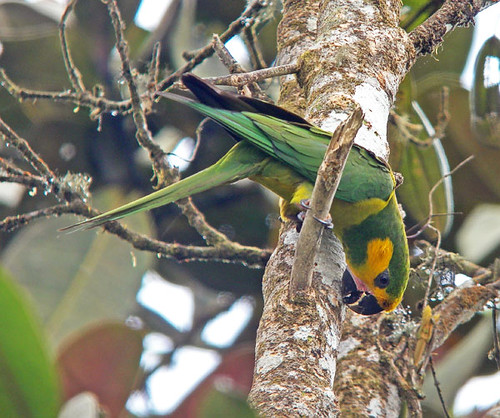 Yellow-eared Parrot © Pete Morris/Birdquest, from the surfbirds galleries.The numbers of the once-thought extinct, Yellow-eared Parrot have increased to their highest levels since the species was found on the brink of extinction in 1998, when just 81 birds were found in one flock surviving in a remote mountainous area of Colombia.
Yellow-eared Parrot © Pete Morris/Birdquest, from the surfbirds galleries.The numbers of the once-thought extinct, Yellow-eared Parrot have increased to their highest levels since the species was found on the brink of extinction in 1998, when just 81 birds were found in one flock surviving in a remote mountainous area of Colombia.
A recent survey count shows that, thanks to conservation actions by the Colombian conservation group Fundación ProAves, in partnership with American Bird Conservancy (ABC), Conservation International-Colombia and Loro Parque Fundación of Spain, the bird has reached historically high population levels. The bird has just experienced the most successful breeding season on record, with 291 chicks fledged from 131 nests, bringing the global population to 1,076 individuals.
“We take great pride in being a continuing part of this amazing recovery effort. The Yellow-eared Parrot is one of many birds in South America that is in need of help. In this case, the partners have done an outstanding job with the many on-the-ground projects that are a key to this bird’s long term survival. This is the kind of partnership effort that serves as a model for the conservation of endangered birds around the world,” said Sara Lara, International Division Director for ABC.
“ProAves is incredibly proud that our decade long dedicated struggle to save this wonderful parrot has proved successful. There is no better measure of success than the bounce-back of the species from the edge of extinction, thanks to our innovative programs of bird reserves, nest-boxes and involving all Colombians and the Catholic Church in saving the species habitat, all with the support of our partners” said David Caro, Executive Director for ProAves.
David Waugh, Loro Parque Fundación Director said “Since the inception of this recovery effort, our foundation has made a firm bet on the ability of Fundación ProAves to make the Yellow-eared Parrot safer. Our year-on-year support totalling around US$ 950,000 has been an outstanding investment, not just because of the remarkable come-back of the parrot population, but also because of the way that ProAves has catalyzed the major involvement of the Colombian people”.
Fundación ProAves implemented several major initiatives to help save the Yellow-eared Parrot. In 2009, the Parrot Conservation Corridor was established to protect the species, and has included the strategic acquisition of over 10,000 acres of critical habitat, accompanied by significant, ongoing reforestation. A nest box program has provided critical new nest sites.
Another important effort has involved the wax palm, Colombia's national tree, which provides critical habitat for the Yellow-eared Parrot, and which is itself in danger of extinction. Use of wax palm fronds for Palm Sunday celebrations was placing additional stress on the tree and parrot populations. ProAves successfully instituted a campaign, supported by Conservation International – Colombia and the Colombian Catholic Church, to educate local Catholic celebrants to the problem and to substitute the fronds of a plentiful, introduced palm.
The Yellow-eared Parrot conservation effort was further advanced by the support and commitment of local governments, rural communities, and environmental education projects such as the Loro Bus, a mobile environmental education classroom. To date, the bus has visited hundreds of schools around the country, spreading the message of parrot conservation to over 150,000 children.
The Yellow-eared Parrot was thought to be extinct until 1998, when Fundación ProAves, funded by Loro Parque Fundación and ABC, rediscovered a colony of 81 birds in the Andes of Colombia, South America. Twelve years later, in May 2010, the Yellow-eared Parrot was downgraded from “Critically Endangered” to “Endangered under IUCN-World Conservation Union Criteria.” The move recognized the remarkable achievements of the conservation organizations in saving the species.